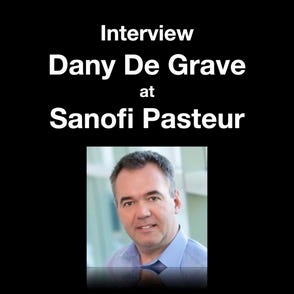This Briefing note is about inclusiveness, a word so common it often loses its meaning. We have 4 perspectives in this Note. The first 3 are from conversations I had with 3 remarkable people. You can listen to our conversations in my podcast. (links below). The 4th is from my own writing, back in 2017, but has become even more meaningful in our current pandemic context.
Shared learning that is self-directed but also serves the whole (Sanofi Pasteur)
Living diversity beyond buzz words (Decathlon)
Letting people develop beyond traditional roles and hierarchy (BlueShore Financial)
Inclusiveness and reachability (based on an article I wrote in 2017)
I look forward to your feedback to the inclusiveness perspectives and would love to hear your thoughts on other factors I have not highlighted.
Inclusiveness Perspective 1. Shared learning
Dany De Grave. Sanofi Pasteur. How can you make learning come alive?
Dany and colleagues have developed an original learning strategy based on three principles: Learn, Apply, Share. It starts with the person and finishes with the organization. It is a powerful way to blend the ambitions of gig-mindset oriented people with the ambitions of the organization. Discover and listen.
Perspective 2. Diversity beyond buzz words
Sophie Criquelon. Decathlon: How to facilitate diversity and inclusion?
Living diversity and inclusion inside Decathlon, a global organization. Starting with yourself and including the world around you. See how teams around the world are making this happen. This is an outstanding example of global collaboration and local specialization. Discover and listen.
Perspective 3. Beyond traditional roles and hierarchy
Marni Johnson. BlueShore Financial. How does Velcro Management build flexibility and readiness?
Velcro management lets you take advantage of the unique skills people in your organization have without being hampered by traditional rules or hierarchy. Discover and listen.
Perspective 4. Reachability
Reachability is even more meaningful in our pandemic and post-pandemic world
I know firsthand that a number of organizations struggled with reachability of employees during lock-down.
My article was originally published in 2017 here and in the Peter Drucker Forum blog that year.
Quoting from the article:
“Reachability means people anywhere in the organization can be contacted directly and individually… ideas and initiatives that originate in one place can reach across the organization, to all interested people. When there is a problem to solve, a challenge to confront, all people in the organization can contribute ideas. From a small company with a few teleworkers to a large organization with thousands of people around the world, reachability is a pre-requisite for inclusiveness. Most organizations do not have sufficient reachability and are therefore limited in their ability to be truly inclusive.”
In the article I ask 10 key questions to help you analyze your reachability:
Do you have technologies and work practices that cultivate inclusiveness?
How would you answer these questions?
Spotted elsewhere
Spotted elsewhere is where I list pieces I find from others that I think you will find interesting. Check it out for items listed in the past.
Jungle challenges the way we think about the world - and ourselves
From The Guardian review of Jungle: How Tropical Forests Shaped the World – and Us by Patrick Roberts and to be published July 1st.
A quote from a prepublication blurb:
“We see that the relationship between humankind and 'jungles' is deep-rooted, that we are all connected to their destruction, and that we must all act to save them. Urgent, clear-sighted and original, Jungle challenges the way we think about the world - and ourselves.”
Edward de Bono, a pioneer no longer with us
From the obituary in The Guardian, 10 June 2021
Author, doctor and inventor of the term lateral thinking who wrote more than 60 books on his original and unorthodox theories…
…It is lateral thinking that creates new ideas – Einstein and Darwin, according to De Bono, were lateral thinkers…
‘It upsets people when I say business is more interested in thinking than universities, but it’s true.’
That’s it for this Briefing Note. Get in touch if you have any comments or questions.
Stay safe and focus on what’s important.
Jane McConnell








